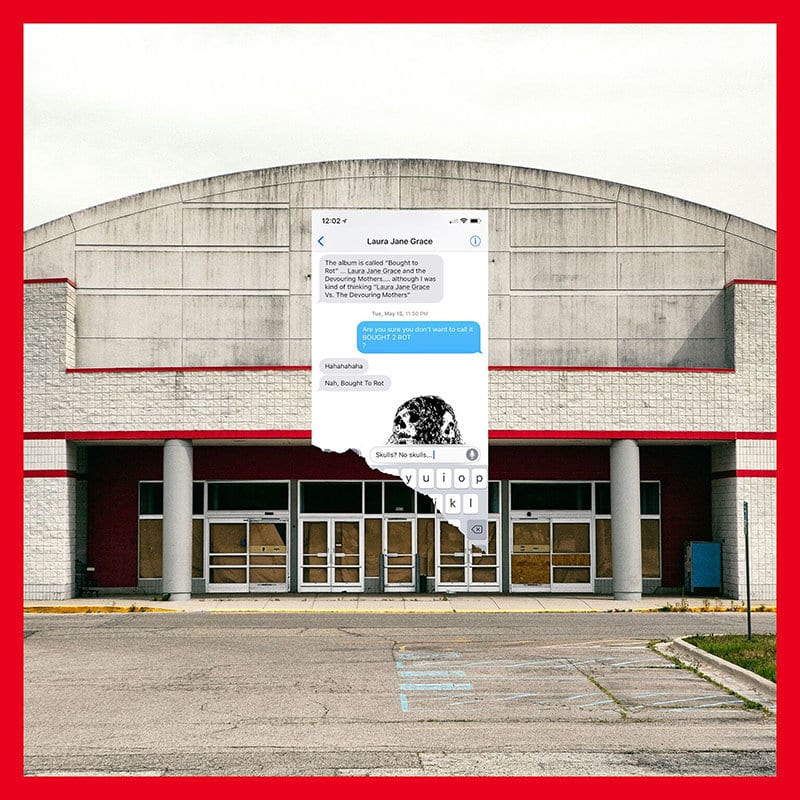
Laura Jane Grace’s objective is to subvert the expectations foisted onto her. Whether pertaining to her musical career or gender identity, Grace’s ability to resist then persevere is enduring and influential. Her recent musical manifestation is no expectation. With the release of Bought to Rot, Grace distances herself as the frontwoman for Against Me! to pursue new creative pathways. Conceived under the pseudonym Laura Jane Grace & The Devouring Mothers, she enlists the creative capacities of the current Against Me! drummer Atom Willard and their longtime engineer Marc Jacob Hudson. It is easy to see the trio as a redressing of Against Me! but such an assumption does not fully encapsulate their innovation.
The album finds Grace assuming her position as the doyen of the downtrodden. The opening track, “China Beach”, is explosive and confrontational as she propels between a quasi-spoken word chant and charged screaming. She turns the track into a script employable by anyone rendered voiceless amidst a confrontation. Willard’s percussion serves as auspicious war drums, calling forth the conflict. True to form, Grace will not surrender. The lyrics evoke the eagerness in which she faces any detractors: “You got something to say? Why are you looking at me, man? You got something to say? Go ahead, and fucking say it, man.” The lyrics are vague enough so each listener can write their own experiences over her narrative without undermining the track’s ethos. This is one of Grace’s longstanding songwriting quirks emblematic of her ability to captivate audiences. Throughout her career, Grace has proven herself as an absolute individual whose existence, ironically, is understandable and relatable across varying standpoints.
Bought to Rot’s punk apogee is “China Beach” since the remainder of the album is cloaked in introspective docility. “Born in Black’s” lethargic tempo and subdued vocals strengthens the track’s message of finding kinship in alienation. The musical restraint is revisited on the subsequent tracks “The Airplane Song” and “Apocalypse Now (& Later)“. Additionally, these three tracks all share the saccharine coolness of the early 2000’s pop-punk. In the latter Grace sweetly croons, “On top of the world, at the end of the world, with you.” That is sweet enough to make one believe in true love’s existence despite the album’s consistent acknowledgment of abnegation.
Yet Bought to Rot isn’t heard through rose-tinted earbuds. “Manic Depression” is a candid and veracious depiction of Grace’s psychological breakdown. While “Screamy Dreamy” exhibits the pains of managing anxiety: “Please come down now and go to sleep / Tomorrow’s already here today / Stop thinking and just try to dream / Please come down now and go to sleep.” By musically portraying her struggles with mental health, Grace illustrates how the journey towards self-acceptance requires tenacity. Her capacity to discuss these important topics positions Grace as an emotional mentor in addition to a musician.
The album doesn’t harbor nihilism and self-hatred. Grace has documented in her writings and activism how self-hatred is synonymous with belittlement and disparagement. She embraces acceptance on the jaunty “Friendship Song”. Here she’s content with her flaws but mostly in awe of those who accept her as an individual: “If we’re reprehensible…And I don’t judge you for it, and that’s what friendship is.” Unquestionably, “Friendship Song” is effacing and beguiling.
Grace qualifies the album as a mix-tape, however, Bought to Rot lacks a connective theme and seems disjointed. In addition to the foray into pop-punk, the album elicits elements from several genres without settling on a single soundscape. At one point, the album even becomes a recitation on her travels. On “I Hate Chicago” and “The Acid Test Song”, the band ricochets between a satirical take on the Midwestern city and a tripping “Catholic girl from Montreal”. It is careless to interpret the abstraction as simple musical defiance or an example of the album’s paucity. Rather, it is Laura Jane Grace & The Devouring Mothers’ method of showing their indifference towards expectations.
Bought to Rot moves Laura Jane Grace & The Devouring Mothers away from the overt politicality and social consciousness evident in Transgender Dysphoria Blues and Shape Shift with Me. The apoliticality is the album’s biggest disappointment considering fans rely on Grace for her music and activism. After all, her power to incite resistance with a mere snarl is notorious. Rather, Bought to Rot is clearly autobiographical as she enshrines the quotidian and writes observations of the mundane. “Amsterdam Hotel Room” and “The Hotel Song” are rudimentary reflections on a musician’s itinerant lifestyle. These tracks are narratives of a humdrum life that nonetheless removes Grace’s celebrity and positions her as an everywoman.
Even with descriptions of luggage and hotel rooms, Grace is undeniably charismatic and honest. Gratifyingly, Laura Jane Grace & The Devouring Mothers balk at musical expectations. Despite, or perhaps due to, the album’s incongruence, Bought to Rot proves empowerment is eventually obtainable.

